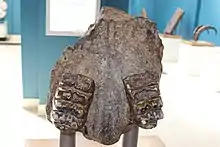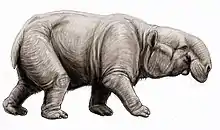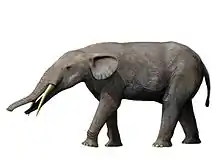Stegodontidae
Stegodontidae is an extinct family of proboscideans from Africa and Asia (with a single occurrence in Europe) from the Early Miocene (at least 17.3 million years ago[1]) to the Late Pleistocene.[2] It contains two genera, the earlier Stegolophodon, known from the Miocene of Asia and the later Stegodon, from the Late Miocene to Late Pleistocene of Africa and Asia (with a single occurrence in Greece) which is thought to have evolved from the former. The group is noted for their plate-like lophs on their teeth, which are similar to elephants and different from those of other extinct proboscideans like gomphotheres and mammutids, with both groups having a proal jaw movement utilizing forward strokes of the lower jaw. These similarities with modern elephants are likely to convergently evolved.[1] Like elephantids, stegodontids are thought to have evolved from gomphothere ancestors.[3]
| Stegodontidae Temporal range: | |
|---|---|
 | |
| Stegolophodon cautleyi | |
.jpg.webp) | |
| Stegodon hunghoensis | |
| Scientific classification | |
| Domain: | Eukaryota |
| Kingdom: | Animalia |
| Phylum: | Chordata |
| Class: | Mammalia |
| Order: | Proboscidea |
| Superfamily: | Elephantoidea |
| Family: | †Stegodontidae Osborn, 1918 |
| Genera | |
Taxonomy
Stegodontidae was named by Osborn (1918). It was assigned to Mammutoidea by Carroll (1988); to Elephantoidea by Lambert and Shoshani (1998); and to Elephantoidea by Shoshani et al. (2006).[4][5] While Stegodon was historically considered an elephant, this is now largely rejected, with the similarities considered to be convergent.[1]
References
- Saegusa, Haruo (March 2020). "Stegodontidae and Anancus: Keys to understanding dental evolution in Elephantidae". Quaternary Science Reviews. 231: 106176. Bibcode:2020QSRv..23106176S. doi:10.1016/j.quascirev.2020.106176. S2CID 214094348.
- Turvey, Samuel T.; Tong, Haowen; Stuart, Anthony J.; Lister, Adrian M. (2013). "Holocene survival of Late Pleistocene megafauna in China: A critical review of the evidence". Quaternary Science Reviews. 76: 156–166. Bibcode:2013QSRv...76..156T. doi:10.1016/j.quascirev.2013.06.030.
- Wu, Yan; Deng, Tao; Hu, Yaowu; Ma, Jiao; Zhou, Xinying; Mao, Limi; Zhang, Hanwen; Ye, Jie; Wang, Shi-Qi (2018-05-16). "A grazing Gomphotherium in Middle Miocene Central Asia, 10 million years prior to the origin of the Elephantidae". Scientific Reports. 8 (1): 7640. Bibcode:2018NatSR...8.7640W. doi:10.1038/s41598-018-25909-4. ISSN 2045-2322. PMC 5956065. PMID 29769581.
- R. L. Carroll. 1988. Vertebrate Paleontology and Evolution. W. H. Freeman and Company, New York 1-698
- J. Shoshani, R. C. Walter, M. Abraha, S. Berhe, P. Tassy, W. J. Sanders, G. H. Marchant, Y. Libsekal, T. Ghirmai and D. Zinner. 2006. A proboscidean from the late Oligocene of Eritrea, a "missing link" between early Elephantiformes and Elephantimorpha, and biogeographic implications. Proceedings of the National Academy of Sciences 103(46)


